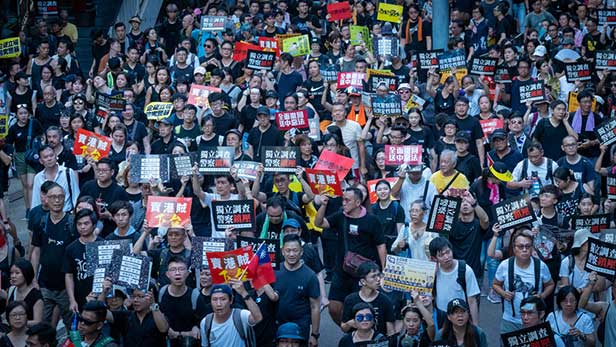August 15, 2019
Hong Kong Unrest Causing Trade Show Concern For Promo Pros
Some industry executives are reconsidering trips to trade shows hosted in Hong Kong during the autumn.
Political unrest in Hong Kong is causing some concern for promotional products professionals that travel to the special administrative region in southern China for trade shows.
Of late, pro-democracy protests have grown in scale in Hong Kong. The marches of recent months have escalated into demonstrators storming government headquarters and shutting down the city’s international airport, something for which protestors subsequently apologized.

Demonstrations in Hong Kong.
The protests have largely been peaceful, though incidents of violence have occurred. And now, China appears to be losing patience. Reports indicate Beijing could take a harder hand in suppressing the protests – a move perhaps evidenced by satellite images showing a Chinese military buildup near Hong Kong.
Amid this complicated geo-political muddle, Hong Kong is gearing up to host a variety of autumn trade shows, a number of which are attended by North American promotional products professionals in search of everything from hot new products to potential sourcing partners. Promo-relevant shows include October’s Asian Gifts & Premium Show, the Hong Kong Electronics Fair, the Global Sources Trade Fair and others. The Canton Fair, another notable show, occurs approximately 80 miles from Hong Kong in Guangzhou.
But now, some ad specialty leaders are reconsidering the sourcing trip abroad. “We were planning on attending, however, I’m reconsidering what my team should do,” Dan Jellinek, executive vice president at Top 40 supplier The Magnet Group (asi/68507), told Counselor. “At TMG, the safety of our employees is paramount.”
Trevor Gnesin, CEO of Top 40 supplier Logomark (asi/67866), said he continues to intend to attend trade shows in Hong Kong. Still, he admits to concern that the protests and potential intervention from Beijing could disrupt the shows or lead to their cancelation. “In that case, we will just do the fairs in China,” he told Counselor.
Should the shows be disrupted, or many promo leaders elect not to attend, could there be potential repercussions for the domestic promotional products industry? Not likely, ad specialty executives said.
“I feel that the last several October shows have not yielded a great deal of innovation,” Jellinek told Counselor. “It was more tweaks to existing products and/or categories. We have plenty of product in R&D as well as in the hopper. If we miss the October shows, this will not hurt us in the least bit.” Added Gnesin: “There won’t be much impact.”
Looking beyond the shows from a promo perspective, the question remains if extended unrest in Hong Kong could lead to broader disruption for the industry. Again, promo executives don't think so -- at least not in the short term.
Marc Simon, CEO of Top 40 distributor HALO Branded Solutions (asi/356000), noted that there are some purchasing agents in Hong Kong, but most production is done in mainland China – effectively meaning supply chains shouldn’t be significantly affected. Even so, Simon added to Counselor that “conditions are changing rapidly” and it will be important to monitor how events play out – and what that could mean for promo.
Opined Jellinek: “In the short run, I do not feel the unrest will have a great impact on our industry. There could perhaps be some shipment delays, but the unrest does not have a direct impact on the end-user in regard to pricing.” Jellinek did note, however, that prolonged unrest in Hong Kong, coupled with import tariffs on products from mainland China, could accelerate the movement among promo firms to diversify their supply chains to destinations beyond China’s borders.
At the heart of the Hong Kong protests is the fact that demonstrators fear that China is encroaching on freedoms enshrined in Hong Kong’s Basic Law – freedoms mainland Chinese people are not afforded. Hong Kong has its own currency and political system, and is allowed to develop its own democracy – cornerstones established when the British turned over the territory to China in 1997.